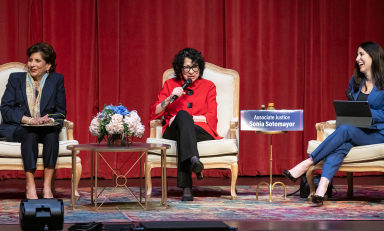July 29 saw the culmination of their efforts in a day-long End of Summer Research Conference, where they presented the fruits of their hard work in the form of 20-minute talks and poster presentations. Dr. Paul Rubin ’75 of Resolvyx Pharmaceuticals gave the keynote address on the use of averages in medical research.
Student research topics included genetic engineering, the rise and fall of the intellectual class in Iran, the adoption of wet cleaning as an alternative to dry cleaning, dark matter, and a psychological study of the implications of children’s belief in Santa Claus. Rigorous undergraduate research – a signature program at the College – allows Occidental students an opportunity for intensive study that would otherwise have to wait for graduate school.
"The summer is really the best time to do research, because you don’t have classes, tests, exams, anything else to worry about or distract you," said Mark Paulsen ’10, a chemistry major from Rolling Hills Estates who plans to attend medical school and pursue a career in pharmacological research. "You can really hone in on your research. You also develop more of sense of community with the people you’re working with in the lab." Under the tutelage of Carl F. Braun Professor of Chemistry Don Deardorff, Paulsen is studying the qualities of molecules and how they can be manipulated for pharmacological applications. His research involves the coniine molecule, the active substance in spotted hemlock ("It’s what killed Socrates."). The goal of his study is to uncover ways to manipulate molecules to reduce the side effects of drugs and increase their efficacy.
"I wanted to get research experience for grad school," said Rebecca Corbett ’10, a biochemistry major from Portland, Ore. who presented a poster on her studies of the yucca plant, found commonly in the United States and Mexico. "There’s not enough time during the school year to give your commitment to your labs and really get some research done." During the academic year, students devote just six hours a week to lab work; during the summer program, they spend six hours a day in the lab, earning a stipend of $3,900. Working with biology professor Gretchen North, Corbett’s research involves extracting DNA from different species of yucca and using computer modeling to determine when and where genetic deviations associated with certain characteristics, such as cold tolerance, appeared.
History major Lauren Mee ’10, from Simi Valley, presented a poster delineating her comparative analysis of former President Ronald Reagan and former British Prime Minister Margaret Thatcher, entitled "The ‘Iron Lady’ and the Cowboy: Gendered Symbols and Cold War Politics." "I wanted to be able to fully delve into a topic, and I felt the Summer Research Program gave me the best option to do that," she said. She plans to roll her research into her 40+-page senior comprehensives paper.
Occidental has supported undergraduate research for more than two decades, including all of the disciplines on campus—the arts, humanities, social sciences, and natural and physical sciences. The program is sponsored by the Ford Foundation Research Fellows Program, the Howard Hughes Medical Institute, the Andrew W. Mellon Foundation, and the National Science Foundation, among other foundations and donors.



